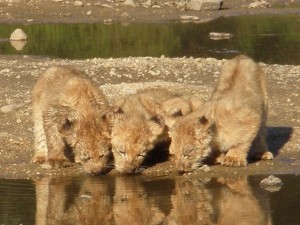Neil S. Braun is dean of the Lubin School of Business at Pace University where he also serves on the Operating Committee of the university. An attorney, Dean Braun has had an extensive career in business and the entertainment industry. In 2010, he came to Pace from The CarbonNeutral Company, a world leading provider of carbon reduction solutions.
Last year, I went to Africa to satisfy a dream of seeing wildlife in their natural habitat. There are no words to adequately describe the awe I felt being among virtually every specie of African animal, and observing them at every stage of their life cycles.
Photos by the Braun Family
Lions feeding on a hippo that had been killed in a territorial battle with another hippo. Cubs and babies of every sort riding on their parents and playing the games of all childhood. Huge herds of elephants crossing rivers and cape buffalo crossing savannas. Hippos looking like cartoon characters as they wade in their pools. Zebras, giraffes, elephants and other grazers and browsers mowing their way through the wilderness. Leopards and painted wolves stalking their prey. The terrain was rugged and civilization was hundreds of miles away. We were in the land where survival of the fittest is the only way of life.
As I watch my kids navigate through college and beyond, and reflect upon my own path, I empathize with high school and college students facing the pressure of an increasingly competitive and demanding job market. There is no doubt that superior quantitative, analytical and communication skills are necessary to be in the game for the career paths with the most opportunity. Math, the natural sciences and engineering are among the disciplines that feed all segments of industry because of the rigor of their curricula and the transferable skills successful students in those disciplines develop.
The long-term challenges of environmental sustainability require both innovation and an economic model that attracts our most able to address our biggest challenges.
Likewise, strategic planning, budgeting, financial modeling and projection, capital allocation and structure, financial statement analysis, positioning, and the best practices for executing in each business discipline demand an investment of time and effort that will yield the analytical and skill sets that are transferable across all segments of industry and society. Though innovation may emanate from any sector, the business disciplines are critical for creating the infrastructure necessary for production and delivery, and the incentive system for attracting those most able to create a thriving economic model.
The world is a competitive place and its resources have limits. The long-term challenges of environmental sustainability require both innovation and an economic model that attracts our most able to address our biggest challenges. Green marketing quickly became green-washing and thus was short-lived. Cap-and-Trade has been a victim of the great recession and a political system that rewards only short term results. Efficiency is the intersection of sustainability and economics on the cost side of the equation; we also need to construct a compelling intersection on the revenue side in order to assure the protection of our air, water, and other natural resources.
As the Dean of the Lubin School of Business, it is my observation that the rigor and scope of business curricula prepares students with the skills necessary to be effective in any kind of enterprise, project or organization. Whether a student wants to be a professional, an executive, an entrepreneur or work in nonprofits or government, knowing how to develop a plan, build a budget, identify the necessary human resources, frame the market opportunity, communicate to all constituencies, and manage it all efficiently and effectively is critical for success.
The rigor of business economics and the rigor of science are both necessary to address our biggest environmental challenges so the failures of the past must not dampen our enthusiasm for finding a system that aligns environmental sustainability with financial reward.















